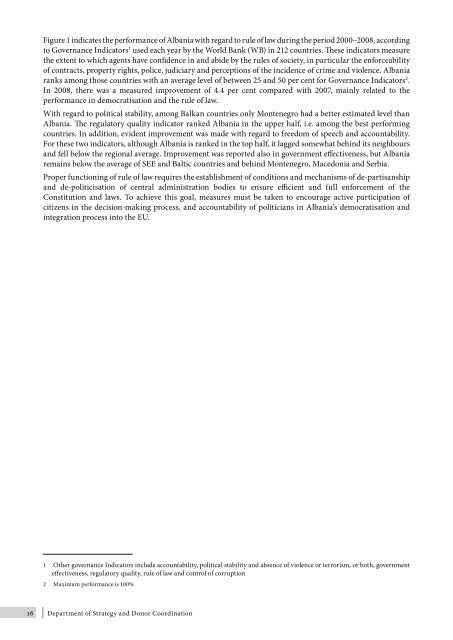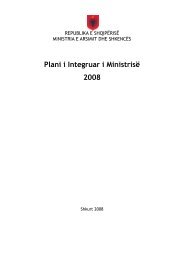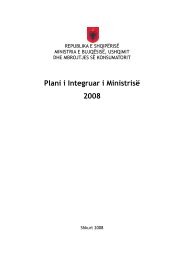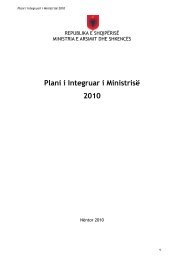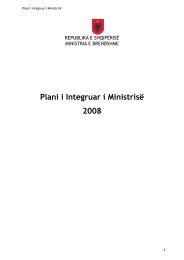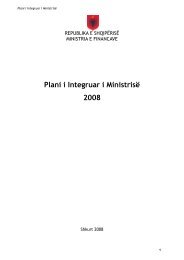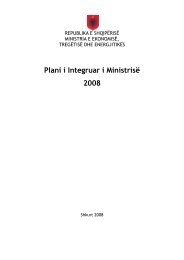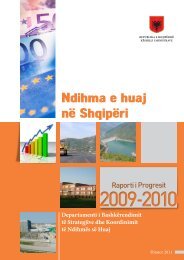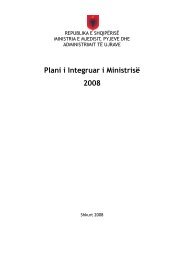Department of Strategy and Donor Coordination
Department of Strategy and Donor Coordination
Department of Strategy and Donor Coordination
Create successful ePaper yourself
Turn your PDF publications into a flip-book with our unique Google optimized e-Paper software.
Figure 1 indicates the performance <strong>of</strong> Albania with regard to rule <strong>of</strong> law during the period 2000–2008, according<br />
to Governance Indicators 1 used each year by the World Bank (WB) in 212 countries. These indicators measure<br />
the extent to which agents have confidence in <strong>and</strong> abide by the rules <strong>of</strong> society, in particular the enforceability<br />
<strong>of</strong> contracts, property rights, police, judiciary <strong>and</strong> perceptions <strong>of</strong> the incidence <strong>of</strong> crime <strong>and</strong> violence. Albania<br />
ranks among those countries with an average level <strong>of</strong> between 25 <strong>and</strong> 50 per cent for Governance Indicators 2 .<br />
In 2008, there was a measured improvement <strong>of</strong> 4.4 per cent compared with 2007, mainly related to the<br />
performance in democratisation <strong>and</strong> the rule <strong>of</strong> law.<br />
With regard to political stability, among Balkan countries only Montenegro had a better estimated level than<br />
Albania. The regulatory quality indicator ranked Albania in the upper half, i.e. among the best performing<br />
countries. In addition, evident improvement was made with regard to freedom <strong>of</strong> speech <strong>and</strong> accountability.<br />
For these two indicators, although Albania is ranked in the top half, it lagged somewhat behind its neighbours<br />
<strong>and</strong> fell below the regional average. Improvement was reported also in government effectiveness, but Albania<br />
remains below the average <strong>of</strong> SEE <strong>and</strong> Baltic countries <strong>and</strong> behind Montenegro, Macedonia <strong>and</strong> Serbia.<br />
Proper functioning <strong>of</strong> rule <strong>of</strong> law requires the establishment <strong>of</strong> conditions <strong>and</strong> mechanisms <strong>of</strong> de-partisanship<br />
<strong>and</strong> de-politicisation <strong>of</strong> central administration bodies to ensure efficient <strong>and</strong> full enforcement <strong>of</strong> the<br />
Constitution <strong>and</strong> laws. To achieve this goal, measures must be taken to encourage active participation <strong>of</strong><br />
citizens in the decision-making process, <strong>and</strong> accountability <strong>of</strong> politicians in Albania’s democratisation <strong>and</strong><br />
integration process into the EU.<br />
1 Other governance Indicators include accountability, political stability <strong>and</strong> absence <strong>of</strong> violence or terrorism, or both, government<br />
effectiveness, regulatory quality, rule <strong>of</strong> law <strong>and</strong> control <strong>of</strong> corruption<br />
2 Maximum performance is 100%<br />
16<br />
| <strong>Department</strong> <strong>of</strong> <strong>Strategy</strong> <strong>and</strong> <strong>Donor</strong> <strong>Coordination</strong>


